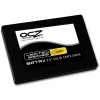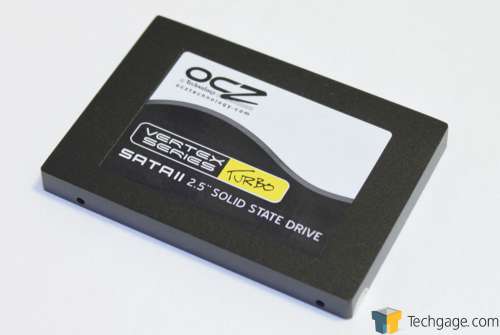- Qualcomm Launches Snapdragon 4 Gen 2 Mobile Platform
- AMD Launches Ryzen PRO 7000 Series Mobile & Desktop Platform
- Intel Launches Sleek Single-Slot Arc Pro A60 Workstation Graphics Card
- NVIDIA Announces Latest Ada Lovelace Additions: GeForce RTX 4060 Ti & RTX 4060
- Maxon Redshift With AMD Radeon GPU Rendering Support Now Available
OCZ Vertex Turbo 120GB

Making the decision to upgrade to an SSD isn’t difficult, but finding the “perfect” SSD is a different story thanks to the sheer amount of choice out there; sometimes even from the same vendor! Fortunately, OCZ’s Vertex Turbo delivers a great blend of performance and GB per dollar, making it well worth consideration.
Page 10 – Final Thoughts
The Toshiba controller gives the venerable Vertex a tough competitor, but it isn’t quite as well suited for smaller file IOPs as the Vertex is. On the flipside, the Toshiba-based SSDNow V+ does offer higher sequential file writes with large file sizes, if this is an important consideration for you.
While the Vertex Turbo is equivalent in price to the SSDNow V+ SNVP325, at the time of this review the standard 120GB Vertex model can be had for as little as $290 after rebate from one major online retailer.
This puts it at $2.41 per GB, which is at the same price point currently held by the cheaper, lower-performing JMicron controller-based drives that are on the market. This makes it an extremely good bargain as far as SSD prices tend to go, and is well worth a look if you are currently or soon will be in the market for a SSD.
OCZ offers a 3-year warranty on their Vertex and Vertex Turbo SSDs and has an extensive forum on their website full of advice, guides, and tips to further improve upon their drive’s already solid performance. Of course the Vertex includes NCQ, TRIM, and the standard 2.5″ SSD form-factor ensuring it will work in most laptops as well as desktops.
With lower power draw than typical hard drives, these SSDs do not get warm and do not make noise. Combined with their significantly higher shock resistance they are perfect for laptops or silent, high-performance computers. We still do not recommend RAIDing SSDs as at the present time enabling RAID will disable TRIM support on any manufacturer’s SSDs.
The performance is already significantly better than even the 10,000K RPM Raptor hard drives and should be more than sufficient for everything except large sequential file transfers. Another thing to consider is that while the 30GB Vertex drives might appear to be more affordable, in most cases users will find they still get a cheaper price per GB by buying a single larger model. Currently 120 – 128GB is the sweet spot in the SSD market and the regular Vertex is no exception.
It is also worth mentioning that while the Indilinx Barefoot controller is used in multiple drives, OCZ has been tuning their own revision of the firmware in-house for awhile now, and so performance will differ a bit from other Barefoot drives running Indilinx’s own firmware. As before, the Vertex Turbo is for all intents and purposes the same drive as the Vertex, just with the controller overclocked for a small boost in performance.
Once at the level where one has a fast quad-core CPU and plenty of 1333MHz or greater RAM the performance gains seen from further upgrades simply diminishes. Sure there is always the next latest graphics card with new features and a higher DirectX version, but honestly nothing else can still give such a computer a very tangible performance boost like an SSD in a modern desktop or laptop.
A strong case can be made for the Vertex series of drives. To make an analogy, the $999 Core i7 980X Extreme Edition offers the undisputed best performance one can get in a desktop CPU today. On the other hand, the $284 Core i7-930 offers “good enough” performance at a much more reasonable price. In reality, the 930 is so good that the only CPU that can beat the Core i7-930 would be a higher clocked model!
In much the same way OCZ’s Vertex is in the same position… it is not as fast as the Vertex 2 or Crucial RealSSD, but it is the much better priced choice, offering performance that is still hard to beat and at $2.41 per GB offers probably the best price/performance ratio of any SSD. As of this writing they offer a lower price/GB ratio on the 120GB model than even Intel’s G2 X25-M series drives while offering anywhere from equivalent to much better performance thanks to their much higher 160MB/s write speed rating (Intel’s 80GB drive is limited to approximately 80MB/s). Not to mention they don’t require an additional investment in a new motherboard with SATA 6Gb/s support for full performance, either!
We should mention that at the time of review Vertex prices were as quoted, but before the article could go live prices fluctuated again with the Vertex. The original Vertex has received a large hike in pricing at several major online stores, despite of (or likely due to) the ongoing rebate program. As of this moment the Vertex Turbo is now officially the cheaper drive than even the regular Vertex, slotting in at $350, which is not only highly unusual but makes the balance between value and performance less straightforward between the now cheaper V+ Kingston and Vertex models. Nonetheless, we feel that if the prices dropped once they will likely drop again to their previous levels, and if they do we wouldn’t hesitate in recommending the Vertex series of drives.

OCZ’s Vertex Turbo 120GB
Discuss this article in our forums!
Have a comment you wish to make on this article? Recommendations? Criticism? Feel free to head over to our related thread and put your words to our virtual paper! There is no requirement to register in order to respond to these threads, but it sure doesn’t hurt!
Support our efforts! With ad revenue at an all-time low for written websites, we're relying more than ever on reader support to help us continue putting so much effort into this type of content. You can support us by becoming a Patron, or by using our Amazon shopping affiliate links listed through our articles. Thanks for your support!





